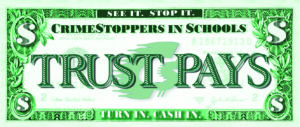Visit CrimeStopper’s newest website: trustpays.org
How the Trust Pays Program Works
Since its inception Trust Pays has generated nearly 1,900 anonymous student tips to CrimeStoppers — by way of trusted adults in school — resulting in the recovery of guns and other weapons, drugs, stolen merchandise, as well as prevented misdemeanor and felony crimes.
Here are highlights from the latest statistics:
| 2024-2025 School Year | YTD (Since 2006) | |
| Guns Removed | 4 | 230 |
| Gang Fights | 1 | 30 |
| Drug Caches | 15 | 1,202 |
Data refreshed: 5 May 2025
An easy, safe and comfortable reporting system for students that is proactive, principal-driven and faculty-involved.
Every faculty member is subject to being a “Trusted Individual” for any given student.
If a student has information on weapons, drugs, or planned violence, he or she will know to go to any faculty member the student trusts.
The “Trusted Individual” will maintain the student’s identity in confidence, but will immediately relay the information received to the principal.
The principal will consider the information and take action.
If the information proves valid, the principal will advise CrimeStoppers and give us the name and contact information for the faculty member selected by the student to be the “Trusted Individual.”
CrimeStoppers will contact the “Trusted Individual” and arrange to pay a reward to the student, at a time and a place of the student’s choosing. The identity of the student will never be known by anyone other than the “Trusted Individual.”

FAQ
Q. What is Trust Pays?
A. Trust Pays is a program for public schools that provides a way for good students to confidentially inform the principal through a trusted faculty member about serious incidents that have occurred or are planned on school grounds.
Q. What kind of incidents?
A. The focus is on serious and dangerous situations — guns or other weapons, drugs, or plans to commit violence.
A. Most students know an adult on the faculty that they can intrinsically trust. This may be a teacher, coach, counselor, assistant principal, or other adult. Whichever person the student entrusts with information WILL ABSOLUTELY keep the student’s name a secret. This is why the information given to the principal will be anonymous.
A. There are other ways the student can provide pertinent information, as described below. The program, however, encourages the building of trust so that every student does know at least one adult in school that can be trusted.
A. Just as with the regular CrimeStoppers program, cash awards are available. Students who provide information that is determined by the principal to be valuable and factual are eligible for a reward.
A. This will be determined in a confidential process that takes into account the information provided. However, the average reward is expected to be about $200.
A. The identity of the student must be kept confidential. For this reason the payment will be made in cash.
A. If a principal tells CrimeStoppers a tip proven to be accurate and valuable, the student will be contacted through the original trusted faculty member. The student will determine when and how the payment will be received. The cash will be handed directly to the student.
A. That is entirely up to the student. Rewards are paid only when asked for.
A. In a perfect world that would be true. But the most important thing is for information to get to authorities in order to prevent dangerous situations in our schools.
A. We believe there is a big difference between being a responsible informant and being a so-called “snitch.” There is a counterculture that tries hard to take the message “don’t snitch” to our young people. This idea does not originate with responsible and law-abiding people. Telling of a crime or potential for danger is being responsible and mature. The difference is a valuable lesson for a student to learn.
A. That possibility exists whether or not Trust Pays is in place. As is always the case, the principal will investigate and decide whether to act upon information given. Anyone who lies runs the real risk of being the one who ends up in trouble.
A. If the student truly feels in danger, the student can get an anonymous note to the principal’s office and never be identified by anyone. If a code or PIN number accompanies the information, it still is possible for CrimeStoppers to make a cash reward, as explained below in the next question.
Q. If a student gives the principal’s office an anonymous note, how can that student receive a reward?
A. If the principal determines the tip was accurate and deserves a reward, CrimeStoppers will be told. The student can call the CrimeStoppers office, 525-5122, between 2:30 p.m. and 3 p.m. on the first Tuesday of each month. The student should identify the school, what was reported, and provide the code or PIN number on the anonymous note. The student is always free to make an anonymous call to our 24-hour tip line, 528-CASH.
Q. How has this program worked elsewhere in the country?
A. To our knowledge, there is no program like this anywhere else. There are regular CrimeStoppers tip line programs in place in schools and colleges in more than 2,000 communities, but they have shown limited success for various reasons. We believe Trust Pays is a better method for the public schools.





